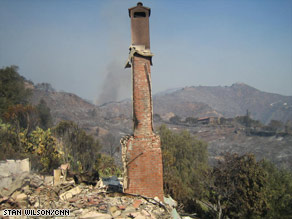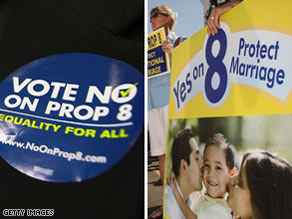MONTECITO, California (CNN) -- One of three major wildfires
burning in southern California appears to be "human caused," a
spokesman for the state's fire agency said Sunday.

The remains of a home sit not far from where authorities say the Santa Barbara, California, fire started.
Investigators
have eliminated "all accidental causes" of the fire that has destroyed
210 homes and injured two in Santa Barbara County since Thursday, and
arson is suspected, spokesman Doug Lannon said.
"We need the public's help in identifying any activity in or around the afternoon of November 13," Lannon said.
The fire has burned 1,940 acres, including a monastery and several
mansions in the Montecito community, where celebrities, including Oprah
Winfrey, have homes. It was 75 percent contained Sunday, Lannon said.  Watch expensive homes go up in flames »
Watch expensive homes go up in flames »
Authorities believe the fire started in the Tea Garden Estate, a
privately owned multi-acre property, about one mile north of Santa
Barbara's exclusive Westmont College. On Friday, arson investigators
cordoned off the estate after several eyewitnesses told authorities
they believed the fire originated in that area, according to Lannon.
The other major fires burning Sunday were in the northern Los
Angeles area and in Orange County, east of Los Angeles. The three
blazes have scorched 20,000 acres and have forced more than 10,000
people to flee their homes, authorities said.
Authorities on
Sunday were searching through the wreckage of nearly 500 mobile homes
destroyed Saturday in the northern Los Angeles area blaze, known as the
Sayre Fire.
As of early Sunday afternoon, a third of the mobile
homes had been searched, and "no human remains have been found,"
according to Los Angeles Deputy Police Chief Michael Moore.
Police had not received any reports of missing persons from the park.
Moore said 134 residents had been accounted for, and that the others
should check in with city authorities.
Los Angeles County
Coroner Ed Winter said authorities believe "most of the people from
this mobile home park were evacuated," and that the search was
precautionary.
The Sayre Fire erupted late Friday in the steep
terrain of the Angeles National Forest on the outskirts of the Sylmar
neighborhood, about 20 miles north of downtown Los Angeles.  See images from the Los Angeles County fire »
See images from the Los Angeles County fire »
The Sayre Fire has burned about 9,500 acres in the San Fernando Valley
and was about 30 percent contained, California fire officials said
Sunday.
Nine other homes and 10 businesses had been destroyed in Los Angeles by Saturday evening, Mayor Antonio Villaraigosa said.
Firefighters were struggling to contain the third blaze, in Orange
County, said Lynette Round, a spokeswoman for Orange County Fire
Authority. iReport.com: 'Insurmountable' wall of flames looms
Firefighters were hoping that strong winds in southern California would die down Sunday, helping them to quell the blazes.
"If the winds die down it will give the firefighters an upper hand on
fighting this," Round told CNN on Sunday morning. "It is a wind-driven
fire and with those gusty winds up to 25 miles an hour, it's giving the
firefighters a really difficult time. It's hopscotched throughout the
county."
Round said 168 homes were destroyed or damaged in the Orange County area. The so-called Triangle Freeway Complex Fire had also damaged a building at a high school, Round said.
That blaze, which has burnt 10,475 acres, is not contained at all, and
is spreading throughout Orange County, posing threats to Yorba Linda,
Corona, Brea, Chino Hills and Anaheim Hills neighborhoods, according to
California fire officials.  Watch residents as fire approaches their homes »
Watch residents as fire approaches their homes »
Winds -- which have joined with low humidity and unseasonably high
temperatures to help strengthen the fires -- were gusting up to 80 mph
Saturday. The high temperature in Los Angeles reached 92 degrees,
according to the National Weather Service.
Gov. Arnold
Schwarzenegger declared states of emergency for the affected counties
after the fire damaged or destroyed hundreds of homes and closed major
freeways.
The move frees up any state resources needed for fire-fighting, and makes the counties eligible for federal assistance grants.
In Los Angeles, Villaraigosa declared a city emergency early Saturday
morning and called for the public's cooperation in conserving energy as
potential blackouts loomed. iReport.com: Share wildfire photos, video
Augustine Reyes and his family left their home in Sylmar about 2 a.m.
Saturday when they could no longer stand the oppressive heat and smoke
encroaching from the hills behind their home.
When Reyes returned to survey the scene Saturday afternoon, all that remained were heaps of charred rubble.
Reyes dabbed his eyes with a bandana as he worried over how to describe the loss to his 7-year-old son.
"He's autistic and doesn't do well with change, so this is going to be very hard to explain to him," Reyes said.  Watch residents reflect after their homes are burned to the ground »
Watch residents reflect after their homes are burned to the ground »
By Saturday afternoon, people were taking refuge in evacuation shelters
set up in three high schools in the area, officials said.
Horses and other large animals were taken to a makeshift shelter in
Hansen Dam Park. A mobile kennel was set up at Sylmar High School, and
small pets can be taken to the Mission animal shelter.
As for the
Santa Barbara County
fire, Lannon urged anyone who may have spotted suspicious vehicles or
people in the area of the Tea Garden Estate in Montecito to call fire
investigators at 951-969-2537, 951-314-0420 or 661-330-0129.
















